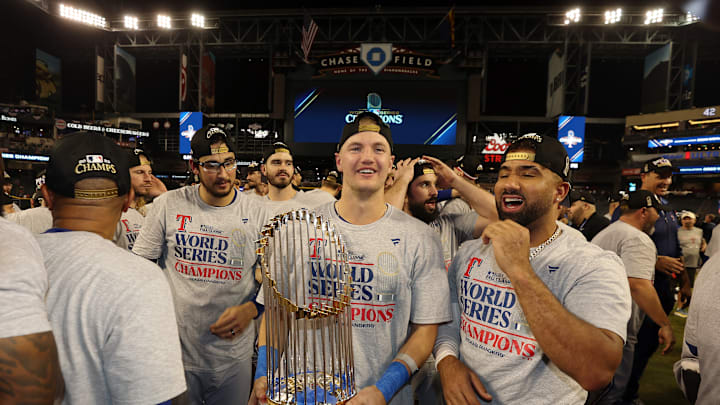5) Jon Gray's 3 innings of relief in game 3 of the World Series
This might be hyperbole, but I do not think Texas wins the World Series without what Gray did in relief of an injured Max Scherzer in game three. It was unexpected and put Arizona into a funk that they would not recover from. Scherzer started the game and pitched three innings. He was hit in the elbow on a 92.6mph ground ball that ricocheted off of him and to Josh Jung who threw out Alek Thomas at first to end the second inning. Scherzer then pitched one more inning. In the fourth, his back started spasming and he had to be removed from the game.
Jon Gray who was maybe considered for a game four start, had to be brought in cold. He was facing a lineup that had just scored nine runs in game two and was now back at home. Texas was up 3-0, but Arizona had overcome larger deficits in the playoffs. If Gray did not have it then Arizona likely would have easily been able to come back and win game three and take a 2-1 lead in the series. Gray who had not pitched more than two innings since going on the IL late in September was up to the challenge.
Gray started with a strikeout of catcher Gabriel Moreno. Then he got into a groove. He retired the first eight batters he faced with three of those on strikeouts. He then gave up a single to Ketel Marte before getting Moreno to fly out to end the sixth inning. Prior to Gray coming into the game Arizona had scored 14 runs in the series, five in game one and nine in game two. After Gray departed in the sixth inning Arizona scored eight runs the rest of the series. The majority of those runs came late in game four when Texas had a 10-0 lead in the game.
The rhythm that Arizona had played with the first two games was gone. The pressure that they had put on Montgomery and Eovaldi in games one and two did not exist with Gray on the mound. He dominated their lineup with primarily just fastballs and sliders. He threw 30 pitches, 15 sliders, 14 fastballs, and one curveball. It was a clinic that completely changed the tone of the entire series. Texas won game three 3-1 and took a 2-1 lead in the series with Gray picking up the win.
